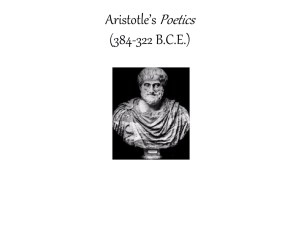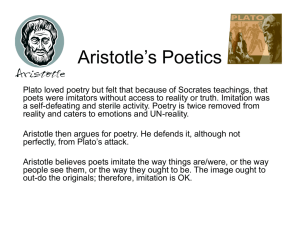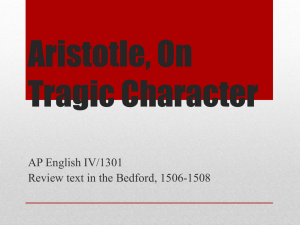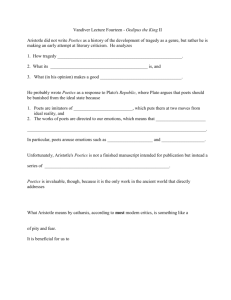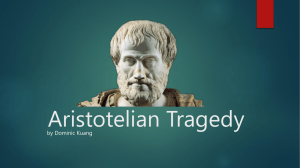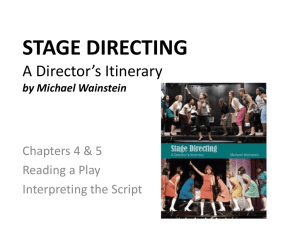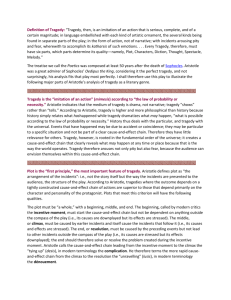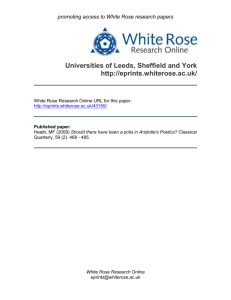Aristotle's Poetics: Summary & Analysis
advertisement
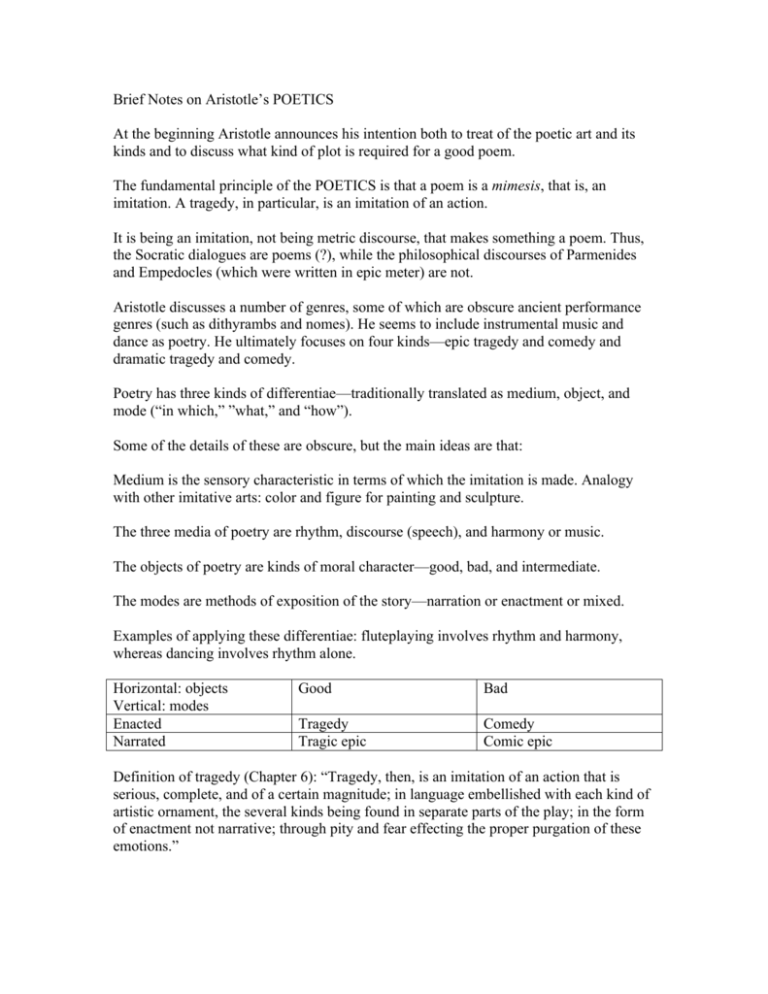
Brief Notes on Aristotle’s POETICS At the beginning Aristotle announces his intention both to treat of the poetic art and its kinds and to discuss what kind of plot is required for a good poem. The fundamental principle of the POETICS is that a poem is a mimesis, that is, an imitation. A tragedy, in particular, is an imitation of an action. It is being an imitation, not being metric discourse, that makes something a poem. Thus, the Socratic dialogues are poems (?), while the philosophical discourses of Parmenides and Empedocles (which were written in epic meter) are not. Aristotle discusses a number of genres, some of which are obscure ancient performance genres (such as dithyrambs and nomes). He seems to include instrumental music and dance as poetry. He ultimately focuses on four kinds—epic tragedy and comedy and dramatic tragedy and comedy. Poetry has three kinds of differentiae—traditionally translated as medium, object, and mode (“in which,” ”what,” and “how”). Some of the details of these are obscure, but the main ideas are that: Medium is the sensory characteristic in terms of which the imitation is made. Analogy with other imitative arts: color and figure for painting and sculpture. The three media of poetry are rhythm, discourse (speech), and harmony or music. The objects of poetry are kinds of moral character—good, bad, and intermediate. The modes are methods of exposition of the story—narration or enactment or mixed. Examples of applying these differentiae: fluteplaying involves rhythm and harmony, whereas dancing involves rhythm alone. Horizontal: objects Vertical: modes Enacted Narrated Good Bad Tragedy Tragic epic Comedy Comic epic Definition of tragedy (Chapter 6): “Tragedy, then, is an imitation of an action that is serious, complete, and of a certain magnitude; in language embellished with each kind of artistic ornament, the several kinds being found in separate parts of the play; in the form of enactment not narrative; through pity and fear effecting the proper purgation of these emotions.” The genre of tragedy is seen by Aristotle as the culmination or perfection of the poetic art. The so-called “parts” of tragedy: Story or plot Character Thought Language Spectacle Song The story is the series of episodes. It ought to have causal unity and completeness. The character is the moral quality of the agent. Thought is the viewpoint of the agent and how he argues for it. Language is the language of the discourse—it ought to be elevated and still clear. Spectacle (I think) is the sensory appearance of a dramatic presentation. Spectacle seems to be thought of by Aristotle as a means of exposition of the story, and to essentially belong to stagecraft as opposed to poetry. Song—music as used in drama. By means of some of these elements poetics is connected to other parts of philosophy— plot and character connects poetics with ethics, thought with logic and rhetoric, language with grammar. In Aristotle’s ethical theory, happiness is the supreme end of human life, and happiness is virtuous activity (in a complete life). Happiness is thus a product of virtue and fortune, and of these two only virtue is within our power. Virtue is of two kinds, intellectual and moral. Intellectual virtue has three spheres—the theoretical, the productive, and the practical. Moral virtue is the tendency or inclination towards those actions which practical reason determines are conducive towards (individual and collective) happiness. Moral virtue is the product of training in the youth and the cumulative effect of one’s history of choices as an adult. All action is for ends, and choice is “deliberate desire,” that is what one desires to do as a result of calculating the means to an end. Aristotle evaluates everything in poetry based on the tragic effect—the purgation of the emotions of pity and fear—about which he says very little. Thus he relegates what some might think of as the existential or theological meaning of the tragedy to the element of thought (that is, which the characters think the meaning of the events is). According to Aristotle the most essential element is story. For the sake of making some further points about the concept of plot, I will now summarize the plot of Sophocles’Oedipus Tyrannus. Upon Oedipus’ birth to the King and Queen of Thebes, a prophecy predicts that he is destined to kill his father. Because of the prophecy the baby Oedipus is exposed but is found and rescued by shepherds. He is adopted and raised by the King and Queen of Corinth, all the time believing that they are his real parents, but as a young man he learns of a prophecy that he is destined to mate with his mother and kill his father. He leaves Corinth to avoid the fulfillment of the prophecy. Traveling to Thebes he quarrels with and kills a man he meets on the road, who, unbeknownst to him, is his biological father, Laius. After arriving in Thebes, he gains power by solving the riddle of the Sphinx and marries the widowed queen, who is, of course, unbeknownst to him, his biological mother. With her he has children. The city falls prey to a plague, and this is generally interpreted as a punishment for its harboring the murderer of Laius. As a conscientious ruler Oedipus resolves to root out and rid the city of its pollution, and in his determination approaches ever more closely to learning the truth. His wife/mother guesses the truth and hangs herself, and when Oedipus finds her he blinds himself with her brooches. He becomes an exile. Aristotle classifies plots as simple or compound. Compound plots contain one or both of the elements of recognition and reversal, and are superior to simple ones. Recognition is the revelation of a character as someone other than he or she has purported to be. Reversal (of fortune) is the transition from good or bad fortune to the opposite. Oedipus Tyrannus obviously contains both recognition and reversal—recognition brings reversal. According to Aristotle, the best tragic plot, because it best evokes the emotions of pity and fear leading to purgation, is the downfall of a good man on account of his hamartia, sin, fault, or flaw. Thus, the plot of Homer’s Odyssey is not ideal in this respect, because the bad fall and the good (Odysseus) rises. Aristotle says that in constructing a good plot the poet ought to “place the scene, as far as possible, before his eyes.” (Chapter 17) Aristotle also says that Homer is most imitative of epic poets because he has the characters, as opposed to the poet, nearly always doing or talking. (Chapter 24) Applying the six elements to fantasy and science fiction (this is me, not Aristotle). We might argue that there is a seventh element, “world.” (In ancient Greek tragedy the world was usually given as the world of the Homeric heroes.) Examples of wonderful worlds of fantasy and science fiction—Middle-Earth, Asimov’s Galactic Empire, McCaffrey’s Pern. Often the primary story has the function of giving a perspective on a larger story— Homeric poems—the Trojan War; Tolkien—the story of the creation of Arda and its progress towards realizing the vision of Iluvatar and the Song of the Ainur. Character can be expanded to include personality—the personalities of the kinds of aliens in the Known Space of Larry Niven. Thought seems to me to be the primary means by which a poem has philosophical content. Spectacle can be thought of as including description of the world and action of the story—what is seen in the mind’s eye or felt by the reader as he / she reads or listens. For the assignment of analyzing a short story or movie, the starting point should be the six parts or tragedy (or seven, counting world).

